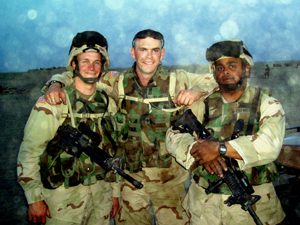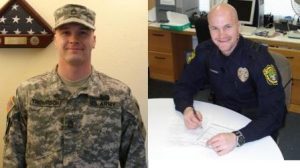You’ve served your country, now serve your community!
Military service can be a perfect entrance into a law enforcement career. While military police and security forces may have the most directly applicable skill set, service members from a variety of occupational specialties are also well suited to police service.
Military veterans make good police officers because of the following traits:
- Sense of service and commitment

- Discipline
- Integrity
- Responsibility
- Ability to work effectively in teams or individually
- Experience dealing with difficult situations
- Ability to problem solve
- Attention to detail
Consider emphasizing these characteristics and offering specific examples during your interview process. Many law enforcement agencies recognize the value of your military experience and reward you for it by:
- streamlining or fast-tracking your applications
- waiving education requirements
- adding preference points to exam scores
- offering incentive pay
- offering service credit toward retirement
Additionally, your law enforcement training may allow you to take advantage of the Veteran’s Administration (VA’s) On-The-Job-Training (OJT) program. This program allows veterans to use their G.I. Bill benefit as an income supplement while attending the academy. This can add hundreds of tax-free dollars on top of your trainee pay. Some agencies will even help process your paperwork with the nearest VA office.
As you look at and compare agencies, be sure to inquire about these and other incentives that may be available to transitioning service members. Those wishing to claim veterans preference should be prepared to submit a photocopy of his/her DD214 form with the application. In some cases, widows can also claim veteran’s preference.
Law enforcement agencies tend to be accommodating to reserve or National Guard service members who are called to duty. You can easily continue your guard or reserve service while maintaining a full-time job as a police officer.
 The International Association of Chiefs of Police (IACP) in partnership with the U.S. Department of Justice, Office of
The International Association of Chiefs of Police (IACP) in partnership with the U.S. Department of Justice, Office of

Justice Programs, Bureau of Justice Assistance (BJA), has published a guidebook for servicemembers who are transitioning out of the military and are considering a law enforcement career. Developed from interviews and focus groups with military veterans serving in law enforcement, “Combat Veterans & Law Enforcement: A Transition Guide for Veterans Beginning or Continuing Careers in Law Enforcement,” shares experiences and tips for veterans as they transition from deployment to a law enforcement career. A comprehensive list of support agencies and networks available to veterans is also included.
Employer Support of the Guard and Reserve (ESGR) promotes a positive environment of support for Guard and Reserve members within the workplace. ESGR also recognizes those employers who go above and beyond to support the servicemembers they employ.
